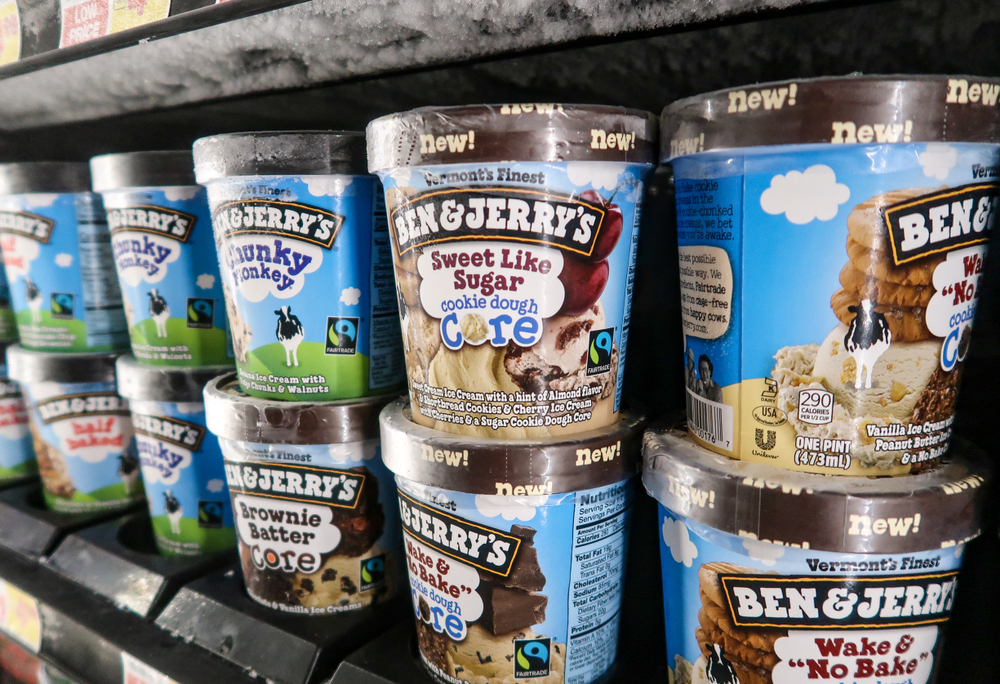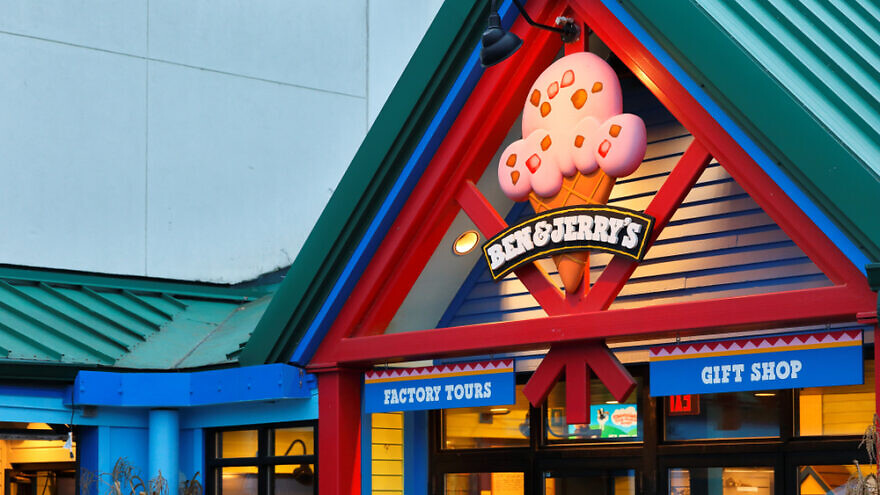BY FAYGIE HOLT AND SEAN SAVAGE
(JNS) The fallout over the decision by Ben & Jerry’s to no longer sell its products in what the company calls “occupied Palestinian territory,” which includes parts of Jerusalem, immediately rippled throughout the Jewish world, with Israel’s leaders and pro-Israel groups urging action and threatening legal consequences against the ice-cream company and its corporate owner, Unilever.
Israeli Prime Minister Naftali Bennett spoke with Unilever CEO Alan Jope on Tuesday, saying that the Jewish state takes the move very seriously.
According to the Prime Minister’s Office, Bennett told Jope that he views the decision as “anti-Israel” and that this action will have “severe consequences, including legal, and [Israel] will take strong action against any boycott directed against its citizens.”
At the same time, Israeli Ambassador to the United Nations Gilad Erdan said that he has written to 35 U.S. governors noting that the decision by Ben & Jerry’s violates individual states’ anti-BDS legislation.
The activity came hours after Ben & Jerry’s, which since 2000 has been owned by Unilever but maintains autonomy when it comes to social causes, posted a letter on Monday saying that it will “end sales of our ice-cream in the occupied Palestinian territory. We believe it is inconsistent with our values for Ben & Jerry’s ice-cream to be sold in the Occupied Palestinian Territory (OPT). We also hear and recognize the concerns shared with us by our fans and trusted partners.”
The letter went on to say that the company will not renew its license agreement with its Israeli counterparts when it expires next year, but will otherwise remain in Israel.
According to NBC News, the statement that was sent out by Unilever on Monday was at odds with the wishes of the independent Ben & Jerry’s board. Unilever’s statement included a promise to remain in Israel, a decision not backed by the Ben & Jerry’s team.
In an online post, Avi Singer, the head of the company that produces Ben & Jerry’s in Israel, said in Hebrew that he will continue to sell his product in all of Israel, adding that “ice-cream is not politics,” a reference to the BDS movement believed to be behind the corporate decision.
He also urged people in Israel to continue buying his product, a request that was echoed by others in the Jewish state.
Professor Eugene Kontorovich, director of International Law at the Jerusalem-based Kohelet Policy Forum, who was instrumental in overturning the Airbnb boycott, said the situation actually exposes the weakness of BDS.
“Ben & Jerry’s extreme ideology has made them adopt a policy that leaves both Jews and Palestinians without a scoop. But it is actually a sign of the failure of the movement to boycott Israel, which can only score victories with consciously ‘woke’ companies. Indeed, Ben & Jerry’s is more anti-Israel than many Arab states, which are opening full economic relations with Israel.”

‘Boycotts are discriminatory and inflame Israeli-Palestinian conflict’
Several pro-Israel groups are urging their supporters to boycott the creators of Phish Food and Chunky Monkey, or at the very least let the company know they are opposed to the decision.
Mort Klein, national president of the Zionist Organization of America, said “Ben and Jerry’s ice-cream’s anti-Semitic refusal to sell their high-fat, high-sugar, overpriced product to 800,000 Jews in Judea, Samaria, eastern Jerusalem only emboldens Jew-haters throughout the world and the terrorist groups of Hamas/Fatah/Iran. Their action will cause more Jewish deaths and injuries than their unhealthy ice-cream will.”
Among their recommendations in an action statement to supporters ZOA encouraged people to stop buying the products and to call or email not only the ice-cream company, but Unilever as well, to express their disappointment.
Similarly, StandWithUs suggested emailing the company and telling them to “reject hate, reject BDS, and do what they can to uplift Israelis and Palestinians alike.”
The Conference of Presidents of Major American Jewish Organizations further emphasized reversing the pronouncement.
“This decision, pushed by BDS activists who are now stating that Ben & Jerry’s did not go far enough by not boycotting all of Israel, demonstrates that some who push these boycotts are not guided by concern over ‘disputed’ territory, but rather seek any excuse to demonize the State of Israel,” Dianne Lob, chair, CEO William Daroff and vice chair Malcolm Hoenlein said in a statement.
Noting that more than 30 U.S. states have anti-BDS laws, the Conference of Presidents urged Unilever to recognize “that boycotts of Israel are discriminatory and further inflame the Israeli-Palestinian conflict.”
“Given their fiduciary responsibilities, Unilever should consider the restrictions that exist in some states on pension fund investments and state purchasing. We call upon Unilever to override the decision of its subsidiary Ben & Jerry’s.”
Meanwhile, Jewish individuals and retailers are also taking action on the local level.
More than half a dozen large kosher-only supermarkets in heavily Orthodox Jewish neighborhoods—including Cedar Market and Glatt Express in Bergen County, N.J.; Seasons in Passaic County, N.J.; Gourmet Glatt on Long Island, N.Y.; and Aron’s Kissena Farms in Queens, N.Y.—have pulled Ben & Jerry’s products from their shelves in protest and making it clear, as more than one said, that “we stand with Israel.”
The boycott is not limited to American kosher markets. Kosher Kingdom Food Market in Melbourne, Australia, announced that it is selling off its remaining Ben & Jerry’s inventory at a discount and will not be restocking the product.
Unilever did not respond to questions by press time.
In a public statement, they said, “The Israeli-Palestinian conflict is a very complex and sensitive situation. … We remain fully committed to our presence in Israel, where we have invested in our people, brands and business for several decades.”





